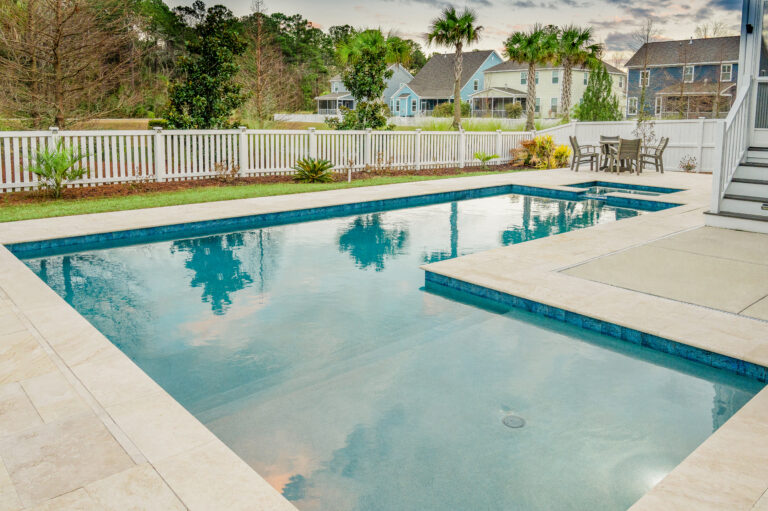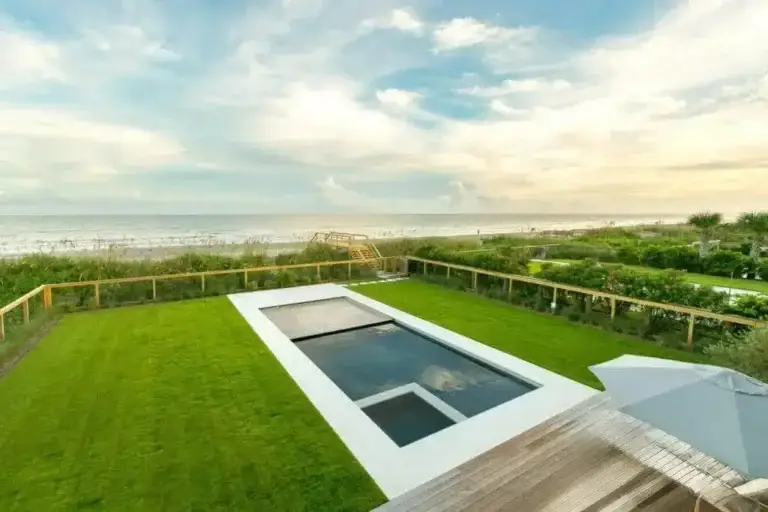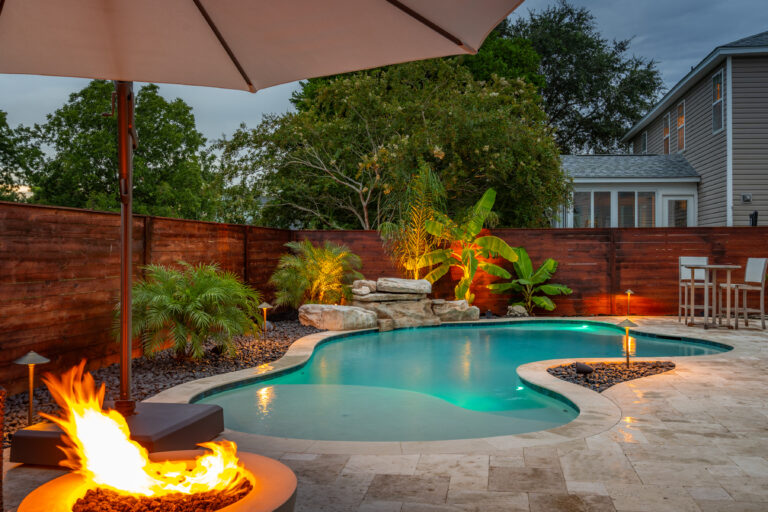Charleston summers should be spent enjoying your swimming pool, not worrying about unexpected repairs. But the truth is, many homeowners skip regular inspections – until it’s too late.
It usually starts small. A little leak. A pump that sounds off. Slight discoloration on the tiles. Most people shrug it off until that “small” issue becomes a costly problem mid-season.
Here’s the good news: consistent, strategic pool inspections can help you avoid nearly every one of those issues. Whether your pool is brand new or a few years old, this checklist will guide you through what to inspect, why it matters, and when to consider professional assistance.
Let’s dive in.
Pre-Inspection Prep: Essential Planning

Before you start your pool inspections, such as checking parts or testing chemistry, set yourself up for success with a few smart preparation steps.
Pool History & Access Records
If your pool was built by Heritage Pools, you likely have easy access to your project documentation, but if not, dig it up. Knowing the year of construction, the type of liner or shell, and any equipment upgrades provides context for what to expect during your inspection. Filters over five years old? Time to pay extra attention.
Have a log of previous repairs? Even better. Keeping a paper trail of issues, such as pump replacements, pipe repairs, or automation failures, helps you identify recurring problems early.
Seasonal Timing Considerations
In Charleston’s humid subtropical climate, your pool is exposed to intense heat, salt, and unexpected freeze events in winter. Plan your primary inspection right before the summer spike (March–April) and a follow-up at the end of the season.
This ensures maximum water clarity during peak use and helps prevent off-season mold or equipment damage.
Structural & Deck Review
Once you’re prepped, start your inspection with the parts you can see and touch.
Tile, Coping & Deck Surface Inspection
Stroll around the perimeter of your pool. Look for cracks in the coping, loose tiles, or any deteriorating grout lines. These issues aren’t just cosmetic. Water can seep in through cracks, slowly affecting the pool’s waterproofing layer and leading to basement mold, concrete rot, or structural shifts.
Use a flashlight to check inside expansion joints and along deck drains for accumulated debris or signs of water seepage.
Surface Drainage & Level Checks
If the deck or yard slopes toward the pool, you’re setting yourself up for soil erosion, standing water, and eventual cracking.
Ensure that the deck has proper slope away from the pool, and test the drainage system by lightly hosing around the area. Pooled water indicates poor grading or clogged channels – both of which invite long-term damage.
Liner, Shell & Waterproofing Health
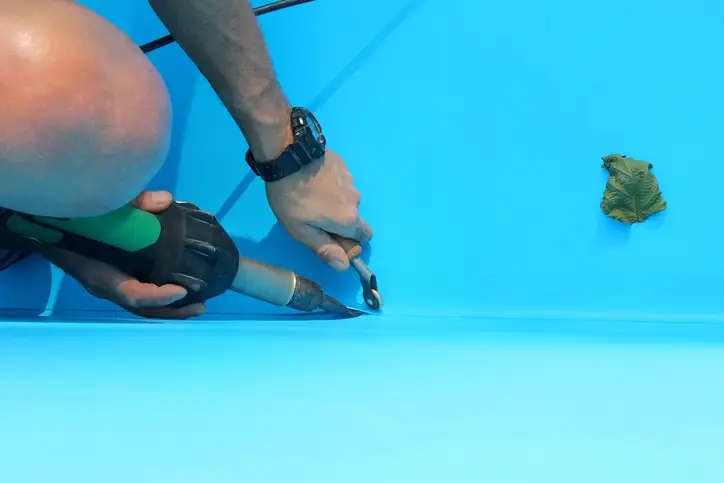
Your pool’s liner or shell is like its skin. Keep it healthy and you’ll extend its lifespan by years!
Liner Wear & Fit Assessment
Vinyl liners typically last 7–10 years. Look for wrinkles, tears, or stretching at the waterline. If your liner is pulling away from the edges or forming bubbles, it could indicate a water supply imbalance or poor pH regulation, leading to liner corrosion.
Check the ladder and skimmer edges – these are common spots for friction damage.
Shell Integrity for Concrete or Fiberglass Pools
For concrete or gunite pools, scan the floor and walls for hairline cracks, etching, or scale buildup from high calcium levels. In fiberglass pools, feel for blistering or soft spots; this could mean internal separation or chemical imbalances affecting the resin.
A pool shell in poor condition isn’t just ugly – it can be a safety risk and a breeding ground for algae or leaks.
Equipment & Automation Diagnostics
The “heart” of your pool lies in the mechanicals. If they’re off, your entire system suffers.
Pump, Filter & Heater Functionality

Listen for any unusual hums or grinding noises from the pump. These often precede complete motor failure. Check for leaks around unions, and inspect the filter pressure gauge – if it reads too high, it may be time for a backwash or cartridge replacement.
Run the heating system (either gas or electric) and note how long it takes to reach the desired temperature. In Charleston, heat pumps are standard, but they require regular service to remain efficient.
Salt Chlorinators, UV & Ozone Systems
These systems handle sanitation, so any slip-up affects your water chemistry. Look for white calcium buildup on electrodes, and check for error codes on the control panel. Don’t forget to inspect flow sensors and grounding wires to avoid stray voltage issues.
Automation Panel & Timer Check-Up
Smart pool systems can glitch, too. Test timers, run through lighting programs, and confirm your automated cycles for filtering and heating. If your setup controls both the pool and hot tub, make sure the dual system responds correctly.
Plumbing & Leak Detection
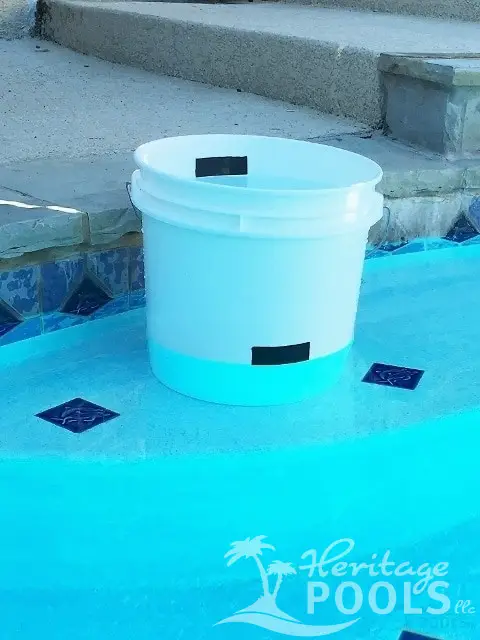
Leaks can be elusive and expensive. Get ahead of them now.
Valve & Pipe Inspection
Check the main shutoff valve, all check valves, and exposed PVC or flex piping for corrosion, moisture, or calcification. In some setups, pipes run near the roofline or basement; check these areas with a flashlight for drips or bulges.
Water Loss Tracking & Leak Testing
Start with the bucket test. Place a bucket on a step, fill it to match the pool water height, and leave it for 24 hours. If the pool water level drops below the bucket level, you’re likely dealing with a leak.
Want to be sure? Our experts at Heritage Pools would be happy to refer you to a qualified company to perform a leak test.
Safety, Lighting & Cover Systems
When doing pool inspections, don’t let minor safety issues become liabilities.
Pool Cover Condition & Fit
An automatic pool cover that skips or jerks during movement is a red flag. Also inspect anchors, cover tracks, and control boxes. If the cover isn’t sealed tightly, debris, rain, and pests can enter – affecting both water quality and equipment performance.
Underwater Lighting & Electrical Safety
Check all lights for flickering, corrosion on housing, and loose lens covers. Ensure GFCI outlets are functioning correctly by pressing the “test” button.
If you’re unsure, bring in a licensed electrician to review your pool’s electrical code compliance, especially if you’ve had renovations or added a spa.
Proactive Tip #1: Balance On-Site Chemistry
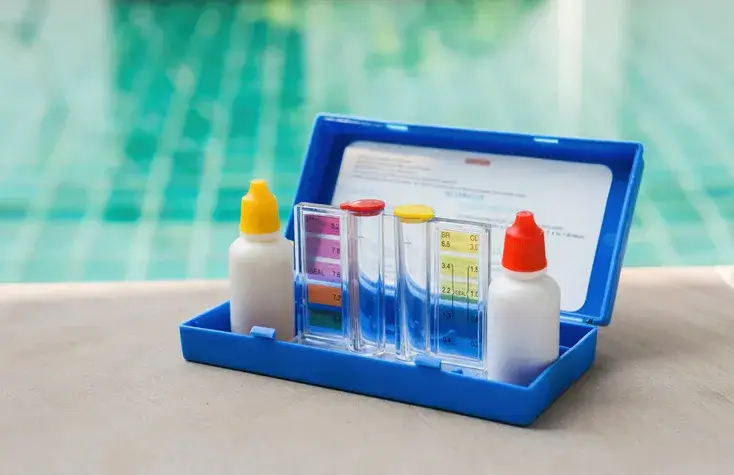
Proper water chemistry doesn’t just affect swimmers – it also protects liners, plumbing, and filtration systems. Test your pool weekly for pH (7.2–7.6), alkalinity (80–120 ppm), calcium hardness (200–400 ppm), and sanitizer levels. Imbalanced water accelerates scale buildup, pipe corrosion, and liner deterioration.
- Use a digital test kit or water treatment service from Heritage Pools.
- Shock your pool during high-heat or heavy-use periods.
- Monthly backwashing keeps filters running efficiently .
A balanced blend ensures clarity, longevity, and fewer repairs.
Proactive Tip #2: Protect From Freeze Events

Even mild Charleston freezes can damage plumbing, valves, or heaters.
Here’s what to do:
- Keep valves open on water features to prevent ice damage through circulation.
- Use a high-quality pool cover to insulate and to avoid freezing.
- During cold snaps, run the pump continuously and insulate exposed lines and equipment.
- Apply algaecide mid-winter, check water level regularly, and store accessories safely.
These steps prevent split pipes, heater damage, and the need for extensive refills.
Proactive Tip #3: Maintain Weekly Cleaning
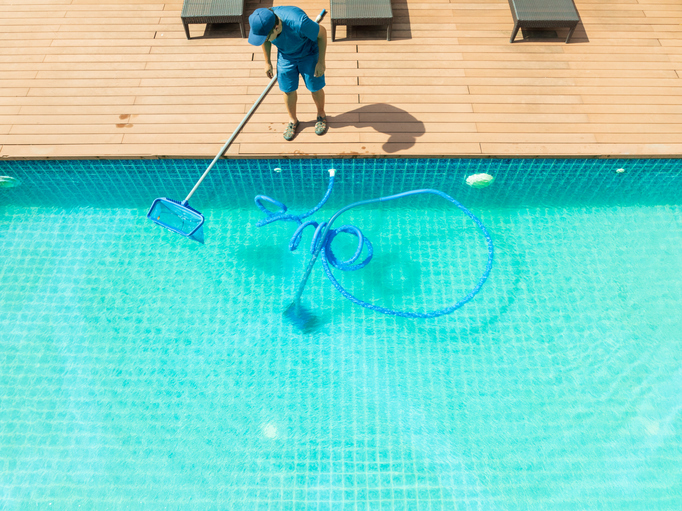
A clean pool isn’t just pretty – it’s also protected:
- Skim daily to remove leaves and insects before they clog the skimmer.
- Brush and vacuum surfaces weekly – this removes algae and debris trapped along walls and steps.
- Deck pressure-wash monthly to prevent slipping hazards caused by algae or dirt buildup.
Routine upkeep boosts water clarity, protects grout and coping, and reduces wear on pumps and filters.
Proactive Tip #4: Schedule Annual Professional Pool Inspections
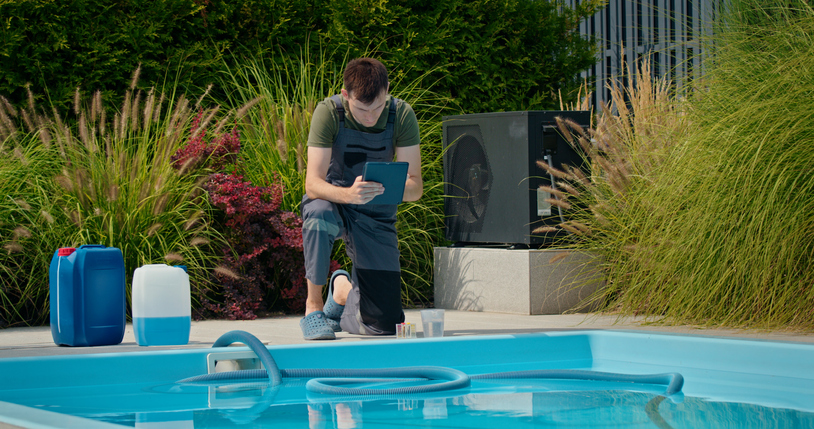
DIY can only go so far. Heritage Pools offers annual expert pool inspections, which include:
- Complete equipment diagnostics (pump, heater, filtration).
- Detailed plumbing pressure and leak testing, as well as inspection of valves and drain systems.
- Comprehensive tile, coping, decking, and electrical safety audits (GFCI, lighting, code compliance).
- A customized inspection report with recommendations to prevent issues before they arise.
This preemptive check is far less costly than waiting for an emergency repair.
Proactive Tip #5: Seasonal Tune-Ups Optimize Performance
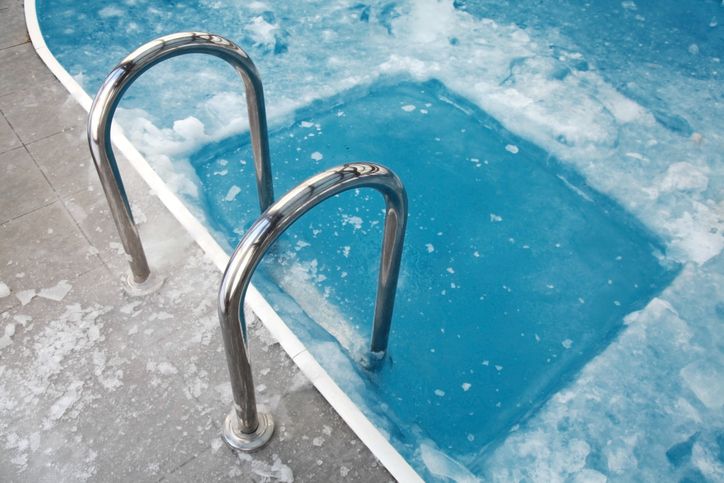
Your pool demands different care throughout the year:
- Spring “open” checklist: test chemistry, pressure-wash deck, reassemble accessories, and inspect for any freeze damage.
- Fall close routine: rebalance water, cover securely, insulate outdoor equipment, and drain low pipes if needed .
Pro Tip: You still need to treat your water during the winter. If you cover and don’t maintain, you risk green water and costly fees come springtime. In fact, this can lead to more expensive cleaning bills than simply cleaning throughout the year.
Two seasonal tune-ups can double your pool’s service life and energy efficiency.
Proactive Tip #6: Track Repairs & Warranty Info

Tracking saves time and money later:
- Log every repair – from liner replacement to plumbing fixes.
- Keep warranty documents on liners, pumps, heaters, and salt systems.
- Use manufacturer coverage before it expires; your records enable smooth claims processing.
- Analyze recurring issues (like a malfunctioning valve or frequent leaks) to fix root causes, not just symptoms.
This ongoing vigilance helps you advocate for repairs and avoid redundant costs.
FAQs
How often should I inspect my swimming pool?
At a minimum, conduct pool inspections twice a year – once before the peak season and again before winter.
Can I spot leaks without tools?
Yes. The bucket test is a simple way to tell if your pool is losing water from evaporation or an actual leak.
What’s are the most commonly missed pool inspections steps?
Most homeowners skip the valves and drains, which are often where early leaks start.
Should I test pool chemistry even if it looks clear?
Absolutely. Water clarity doesn’t always mean chemical balance is perfect. Test weekly to avoid corrosion or scaling.
Is a smart automation system worth it?
If you have complex systems or multiple zones (such as a pool and hot tub), automation offers precision and saves energy – just be sure to inspect the panel and sensors regularly.
Pool Inspections Today, Peace of Mind Tomorrow
A swimming pool is more than a backyard feature. It’s an investment in your home, health, and happiness. At Heritage Pools, we’ve seen how thorough pool inspections can save homeowners thousands in repairs and extend the life of their pool by years.
Our team of experts at Heritage Pools is happy to visit your home and take a look at your pool. If a full pool inspection is required, we’re delighted to refer you to a professional to help!
Ready to extend your pool’s life? Contact us today!

